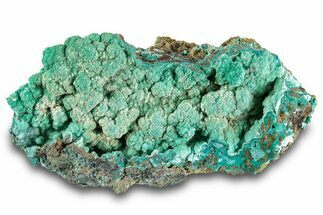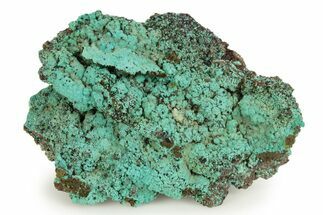This Specimen has been sold.
1.35" Bright Blue Chrysocolla on Limonite - Namibia
This is a colorful formation of a large mass of blue and teal chrysocolla over bits of brownish limonitic host rock. It was collected near the city of Opuwo in the Kunene Region of Namibia. Portions of the edges have green conichalcite.
This specimen has been mounted to an acrylic display base.
This specimen has been mounted to an acrylic display base.
Chrysocolla is a basic copper silicate that typically forms as a pseudomorph following other copper based minerals. The chemical formula is considered undetermined due to the varying substitutions of elements and water content in its chemical structure. However, there is a form of chrysocolla with an identifiable chemical formula of Cu2H2Si2O5(OH)4 that can be found in microcrystals.
Regularly, chrysocolla will form as botryoidal lumps and spheres, rarely forming visible crystals. It can also form in both solid and fibrous veins, over fibrous minerals, and in crusts. Known for its sharp and vibrant coloring, chrysocolla can display a wide variety of colors such as bluish-green, bright green, light blue, to even sometimes multicolored specimens depending on the atmosphere present during formation.
Regularly, chrysocolla will form as botryoidal lumps and spheres, rarely forming visible crystals. It can also form in both solid and fibrous veins, over fibrous minerals, and in crusts. Known for its sharp and vibrant coloring, chrysocolla can display a wide variety of colors such as bluish-green, bright green, light blue, to even sometimes multicolored specimens depending on the atmosphere present during formation.
About Conichalcite
Conichalcite is an arsenate mineral that forms as a secondary mineral in the oxidized zones of copper deposits. Often it will bear a vibrant green color, though it will display a variety of colors from grass-green to yellow-green. It is the arsenic-rich end member of the series, and calciovolborthite is the vanadium-rich end member.
Conichalcite contains a significant amount of poisonous arsenic, making it somewhat toxic. Therefore, washing hands following handling of conichalcite specimens is recommended.
Conichalcite is an arsenate mineral that forms as a secondary mineral in the oxidized zones of copper deposits. Often it will bear a vibrant green color, though it will display a variety of colors from grass-green to yellow-green. It is the arsenic-rich end member of the series, and calciovolborthite is the vanadium-rich end member.
Conichalcite contains a significant amount of poisonous arsenic, making it somewhat toxic. Therefore, washing hands following handling of conichalcite specimens is recommended.
SPECIES
Chrysocolla
LOCATION
Opuwo Rural, Kunene Region, Namibia
SIZE
Entire Specimen: 1.35 x .9"
CATEGORY
ITEM
#295924
 Reviews
Reviews












